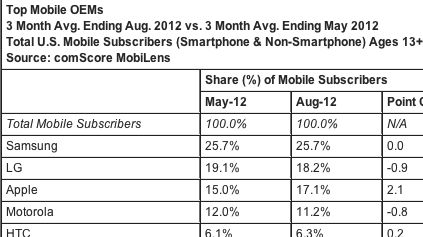Report shows Samsung US market share stymied while Apple's grew
And that was before the iPhone 5

Sign up for breaking news, reviews, opinion, top tech deals, and more.
You are now subscribed
Your newsletter sign-up was successful
Though Samsung has dominated the U.S. cellphone market for most of 2012, new numbers reveal Apple is closing in on the No. 1 spot.
Using data from more than 30,000 subscribers, comScore's latest market share report revealed Samsung has leveled off, while Apple continues to add more and more users.
Samsung devices are used by 25.7 percent of the censused consumers, according to the August 2012 numbers, but that percentile hasn't changed one iota since May.
Apple on the other hand saw its consumer base grow to 17.1 percent last month, which is a 2.1 percent increase over May's 15 percent stake.
What's even more telling is that Apple saw the only significant increase of all smartphone providers, and this was before the iPhone 5 was even announced.
Forward thinking
Despite Apple's improving numbers, the company's actually still in third place overall in the U.S.
LG, though No. 2 on the list, has seen its grasp on the second spot become more tenuous based on this latest report.
Sign up for breaking news, reviews, opinion, top tech deals, and more.
Previously holding onto 19.1 percent of the market, LG lost .9 percent of its consumer numbers from May through August.
With Apple breathing down LG's neck even before the iPhone 5 was revealed, the next three months don't bode well for the South Korean manufacturer, despite the infusion of devices like the Optimus G onto the market.
HTC was the only other company to see an improvement in its numbers, but the .2 percent increase in consumer handsets was hardly enough to lift HTC out of last place.
Whether the arrival of the HTC One X+ will make a difference remains to be seen, but its release is unlikely to bolster HTC's numbers the same way the iPhone 5 could improve Apple's.
Android's still the dominant OS
Even if Apple is somehow able to overcome Samsung's stranglehold on consumers, Google's Android OS will still be used in more phones than iOS.
Android and iOS sit atop the operating system standings with 52.6 and 32.3 percent shares, respectively.
Even iOS 6 is still only available on iPhones, whereas Google's Android OS is available on dozens of smartphones, making it rather difficult for Apple to catch up.
Research in Motion's BlackBerry OS, currently in third place, fell 3.1 percent in the three-month period between May and August, and now rests at a paltry 8.3 percent.
Microsoft didn't have quite as bad a quarter, falling only .3 percent, but the Windows Phone OS is barely making a dent at 3.6 percent of the market.
Even with Nokia launching an all out assault with Windows Phone 8 very shortly, the additional boost Microsoft will get over Symbian's .7 percent share may only be enough to surpass declining RIM.
When the next set of comScore numbers arriving this November, it will be interesting to see just how much a difference the iPhone 5 makes for Apple, and whether or not Microsoft can overtake RIM with Windows Phone 8.